OUR KEITH MEMORIES
Part 2 - AGAIN!
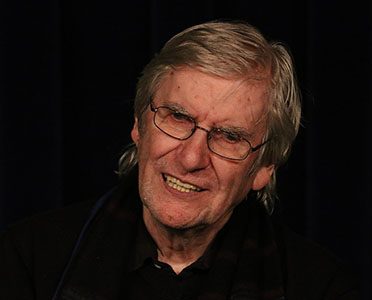
“The audience will lend you their attention, as long as you pay it back later, with interest.”
– Keith Johnstone
The Life game was arguably Keith’s favourite Format. He protected it as a parent would protect their child. And no wonder. I remember at a conference in Banff Canada, Keith was asked how he felt about people around the world adapting Theatresports, into something that didn’t represent his initial intent.
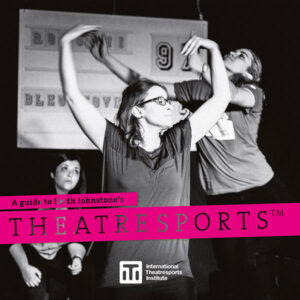 “The first thing people do is remove the horn for boring. They lower the risk”. At this point Keith closed his eyes and shook his head. I’d heard him say these words many times before adding that he had nearly given up entirely on this first format-offspring. “It’s like watching them take your child and putting garish red lipstick on her and selling tickets for people to take a look”
“The first thing people do is remove the horn for boring. They lower the risk”. At this point Keith closed his eyes and shook his head. I’d heard him say these words many times before adding that he had nearly given up entirely on this first format-offspring. “It’s like watching them take your child and putting garish red lipstick on her and selling tickets for people to take a look”
(If you’ve seen Theatresports and disliked it because of the stupidity, the lack of risks and the waste of time, then you haven’t seen Keith’s Theatresports. You’re probably watching the result of fear filled groups who weren’t willing to take the time to understand what damage they were doing to a wonderful structure that created remarkable work and protected the audience more than it protected the egos of near sighted ‘performers’.
If you produce Theatresports and remove the horn and make the judges look like idiots, thinking you know better how to present Keith’s format, maybe reconsider what you are doing. (Or stop calling it Theatresports to honour what Keith created.)
I called Keith Johnstone this weekend to see how he was. We chatted for a bit then he gave me a mini-workshop in his wonderful and seldom performed format The Life Game.
He said, “I once heard of a woman who refused to die until all of her family was at her bedside. If we staged that scene it would have been boring, but if we put an actor in a skull mask and the actor wrestled with the woman in bed…un-seen by everyone else – it might be exciting. Suddenly the woman is screaming and pushing away death! I’d like to see that.”
“We were working on The Life Game and the guest was talking about when his parents divorced. Just staging the divorce would not have been interesting. So, we created large drawings of both parents on panels upstage ..then slowly pulled them apart.”
I am so grateful for every conversation and every workshop with Keith.
I’ve directed The Life Game several times and there are moments from those shows, I will never forget.Thank you Keith for pushing for improvisational theater that asks us to uncover who we are and share that with a community.
—Mats Eldøen – Oslo – Det Andre Teatret
I remember when we did the Lifegame workshop. We wondered how we could stage/improvise a scene based on a story where a kid snuck in to steal his dads gun. After trying every angle for nearly two hours, we exclaimed that we were empty. Then he shrugged and said he didn´t think the story was worthwhile and would never try to stage it at all. Haha, learned so much that day. I always kept thinking he´d be back to do another class.
An interesting side of Keith was watching him dance with the story. Mostly he lead with confidence and consistency. There would be nights after he’d directed another of his formats, “Maestro”, however, where he would sit on stage to give us notes and say, “I wasn’t much help tonight.”
That extraordinary humility took the pressure off us. And it taught us to recognize that this is more magic than science some nights. Those who NEVER FAIL, might not be improvising as much as we might think.
Having said that, Keith’s worst night was still an admirable night for many of us.
The Hideout had the good fortune to convince Keith Johnstone to come teach workshops here in Austin in 2010. When we were planning it out, two separate people closely connecting to him gave us very similar advice: “Don’t take it personally if he has harsh things to say about your theater or your shows.”
So we were excited, but nervous, of course. The Hideout’s style of improv, and the core tenants of what we teach all started with Johnstone. The Hideout started life as “Austin Theatresports,” and Theatresports was created by Johnstone.
But whatever fear we had melted away. We had a magical few days with him.
I just observed the intensive, but I got so much out of it. I’d been taught by people taught by him before (and even by him for a few hours in San Francisco), but suddenly so much made sense.
Honestly, the biggest takeaway and surprise for me was that he was still working on and experimenting with his ideas. The stuff we’d been taught 2nd hand had seemed kind of set in stone at times, but I got the sense that every exercise/scene he set up was still him playing with the variables to see what happened.
Counterintuitively, it was his sense of exploration and experimentation over that weekend that inspired me to go further afield, and to draw more of our own conclusions about what we liked, and what we wanted to pursue.
I also had the pleasure of hosting a Maestro show (another show structure/format Johnstone invented) that he and Andy Crouch directed at the Long Center. I loved watching him hold his hands up during each scene and just lightly twinkling them down when he wanted the scene to end. And afterwards, we got like the best praise possible, which was something like “Well that didn’t go horribly.”The Hideout still does Maestro every weekend… and we have done so every weekend we’ve been open since 1999. We -might- have done more Maestros than any other theater in the world, but we’re certainly near the top.
Storytelling and change and status have been baked into Johnstone’s approach to the work since the beginning, and as such they’ve been baked into The Hideout and PGraph as well. Though Johnstone was always dubious of improvising full-length plays (“What if the audience hates what you’re doing?”), it’s entirely his fault that we’re doing them.
This is a jumble of thoughts, but I wanted to mark his passing. Johnstone himself rejected the guru label, and he was right to do so. So instead I’ll say that he was a curious and playful human, whose inspiration and insight inspired countless others in return.
When all of us were stuck without an idea of how to direct a scene after interviewing a man who told the story about shooting himself in the chest in an attempted suicide, leaving a bullet too close to his heart to be removed, Keith calmly asked for a performer to play the heart and another to play the bullet to stand on stage as close as they could be without touching.
It was gripping and touching and memorable and still clear in my mind after more than 30 years when Keith directed it.
(After the show, Keith said we needed something, at that point in the show. And it was always best not to recreate the story as it was told. The audience has already done that in their imagination. Our job was to find the story on the edge of what we know.)
Nils Petter Morland – Oslo – Det Andre Teatret
LifeGame really changed the game for me.
We had Keith over to Oslo in 2011 for 10 days of working on it. Every day he said “We are asking the wrong questions. We have to come up with better questions.” He said the last big taboo is that we don’t really ask each other questions that matter, so we don’t get real conversations
We got to “Lifegame” Keith as well and had him act out his mother (if memory serves). And he also told a beautiful story about how he went to the zoo in London alone on LSD. There are some amazing memories from countless shows after that. One that really sticks is one where we had a priest as the guest.
I got to play the guest. In the end scene, we did the St.Peter-game where the guest plays St.Peter and looks in the Book of Life to make a decision about whether or not the guest (played by me) should get into heaven.
So I went the route saying “I never lied”, “I never hit anyone in the face”, “I never used porn” and so on. And the guest saying yes or no all depending on the reality from his life. Some laughter and giggles from the audience.
But then I said with a smile “But in the end – I was always on God’s side!” Then the guest stood abruptly up and smashed his fist in the table between us saying loud with a strict voice “No Harald! (which was his name) It was God that was on your side!“
There was this wonderful gasp from the entire audience. Two seconds of silence and then wild applause!
Religious or not – this moment of true human emotion and honesty only LifeGame can achieve in the theatre.
Like a great book we want to read more of, Our memories continue.
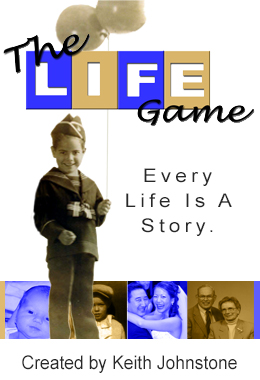

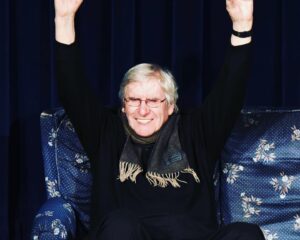 I am so grateful for every conversation and every workshop with Keith.
I am so grateful for every conversation and every workshop with Keith.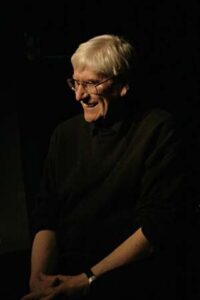 The Hideout had the good fortune to convince Keith Johnstone to come teach workshops here in Austin in 2010. When we were planning it out, two separate people closely connecting to him gave us very similar advice: “Don’t take it personally if he has harsh things to say about your theater or your shows.”
The Hideout had the good fortune to convince Keith Johnstone to come teach workshops here in Austin in 2010. When we were planning it out, two separate people closely connecting to him gave us very similar advice: “Don’t take it personally if he has harsh things to say about your theater or your shows.” LifeGame really changed the game for me.
LifeGame really changed the game for me. 



0 Comments